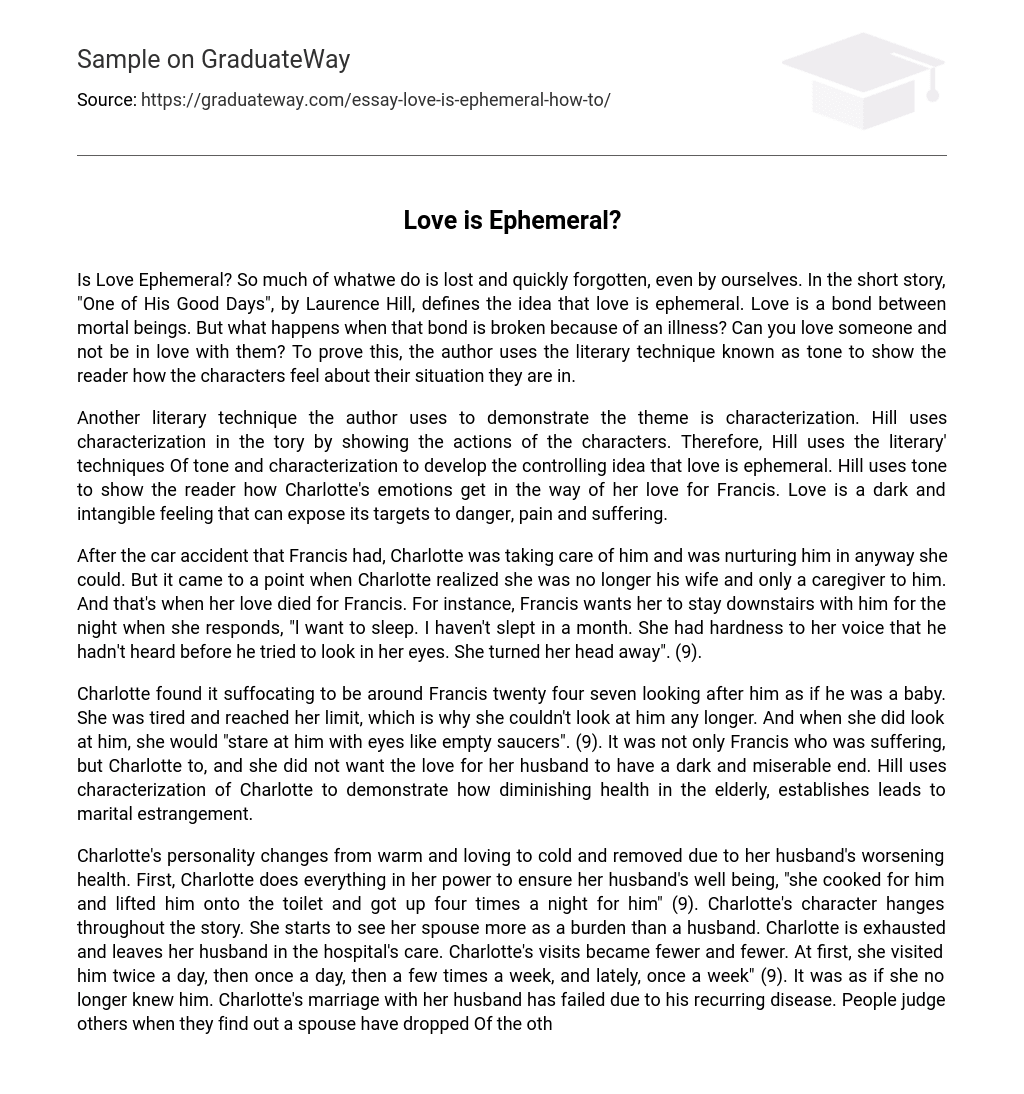Is Love Ephemeral? So much of whatwe do is lost and quickly forgotten, even by ourselves. In the short story, “One of His Good Days”, by Laurence Hill, defines the idea that love is ephemeral. Love is a bond between mortal beings. But what happens when that bond is broken because of an illness? Can you love someone and not be in love with them? To prove this, the author uses the literary technique known as tone to show the reader how the characters feel about their situation they are in.
Another literary technique the author uses to demonstrate the theme is characterization. Hill uses characterization in the tory by showing the actions of the characters. Therefore, Hill uses the literary’ techniques Of tone and characterization to develop the controlling idea that love is ephemeral. Hill uses tone to show the reader how Charlotte’s emotions get in the way of her love for Francis. Love is a dark and intangible feeling that can expose its targets to danger, pain and suffering.
After the car accident that Francis had, Charlotte was taking care of him and was nurturing him in anyway she could. But it came to a point when Charlotte realized she was no longer his wife and only a caregiver to him. And that’s when her love died for Francis. For instance, Francis wants her to stay downstairs with him for the night when she responds, “l want to sleep. I haven’t slept in a month. She had hardness to her voice that he hadn’t heard before he tried to look in her eyes. She turned her head away”. (9).
Charlotte found it suffocating to be around Francis twenty four seven looking after him as if he was a baby. She was tired and reached her limit, which is why she couldn’t look at him any longer. And when she did look at him, she would “stare at him with eyes like empty saucers”. (9). It was not only Francis who was suffering, but Charlotte to, and she did not want the love for her husband to have a dark and miserable end. Hill uses characterization of Charlotte to demonstrate how diminishing health in the elderly, establishes leads to marital estrangement.
Charlotte’s personality changes from warm and loving to cold and removed due to her husband’s worsening health. First, Charlotte does everything in her power to ensure her husband’s well being, “she cooked for him and lifted him onto the toilet and got up four times a night for him” (9). Charlotte’s character hanges throughout the story. She starts to see her spouse more as a burden than a husband. Charlotte is exhausted and leaves her husband in the hospital’s care. Charlotte’s visits became fewer and fewer. At first, she visited him twice a day, then once a day, then a few times a week, and lately, once a week” (9). It was as if she no longer knew him. Charlotte’s marriage with her husband has failed due to his recurring disease. People judge others when they find out a spouse have dropped Of the other at the door Of a hospital or nursing home. But at what cost? Is it better to take care of your partner and uffocate, or is it better to get the proper care for them and be happy as well?
Hill portrays to his readers that sometimes it is alright to a little bit selfish, then to live a depressing and suffocating life. He demonstrates the idea that love is ephemeral by focusing on Charlotte’s tone and actions toward her husband Francis. As much love and care she has for him, she is no longer in love with him.





